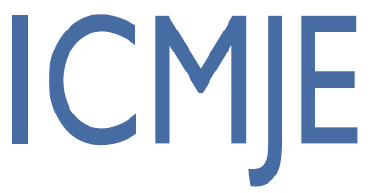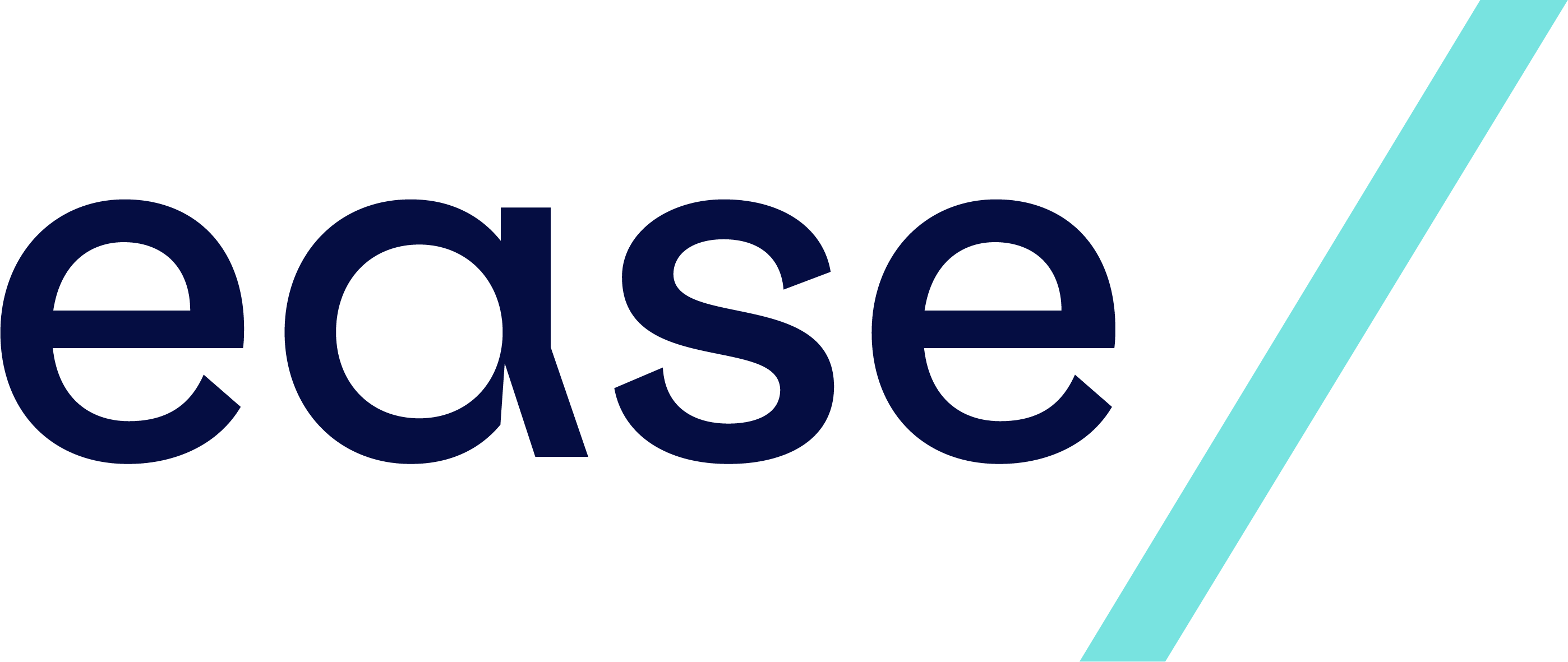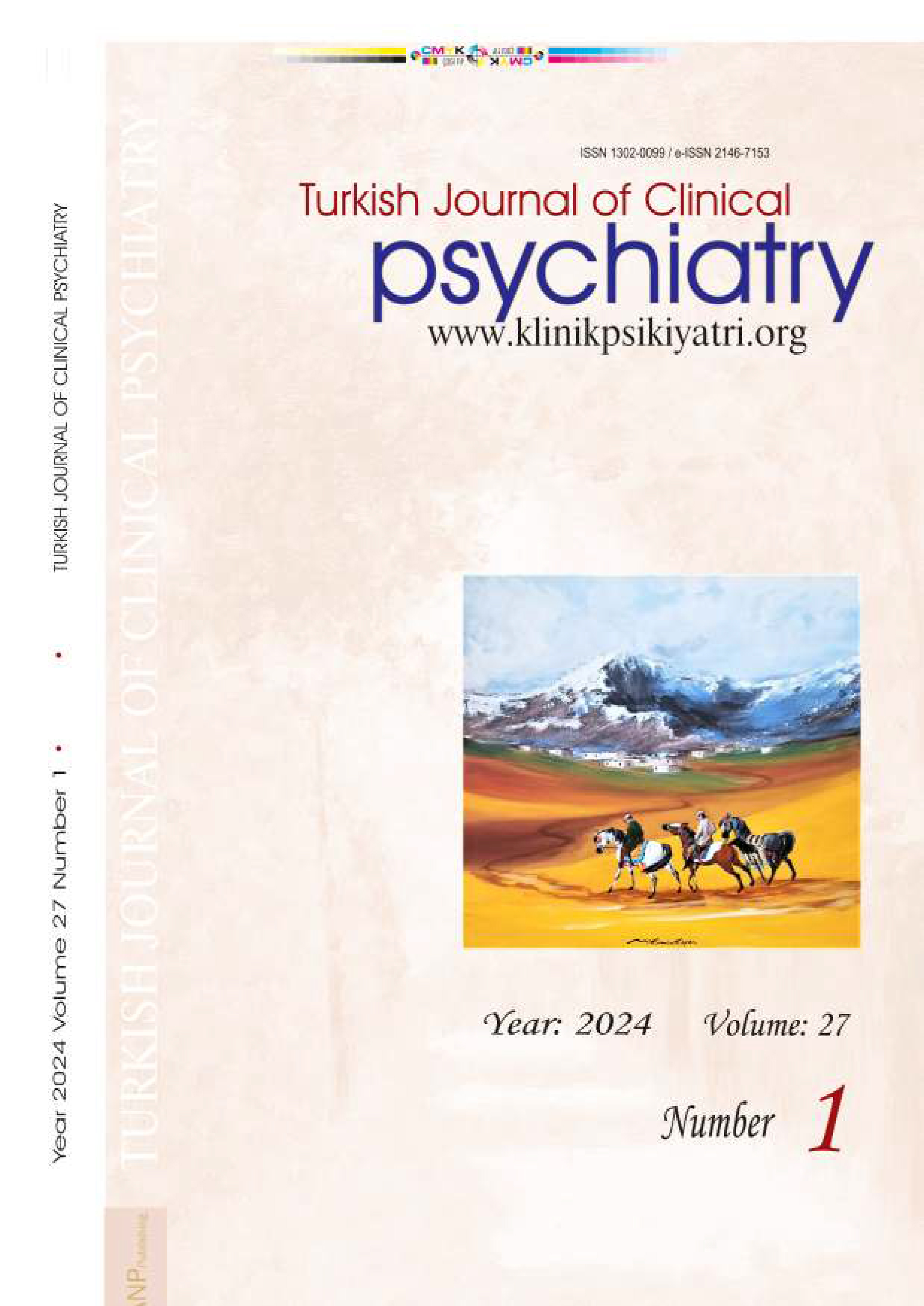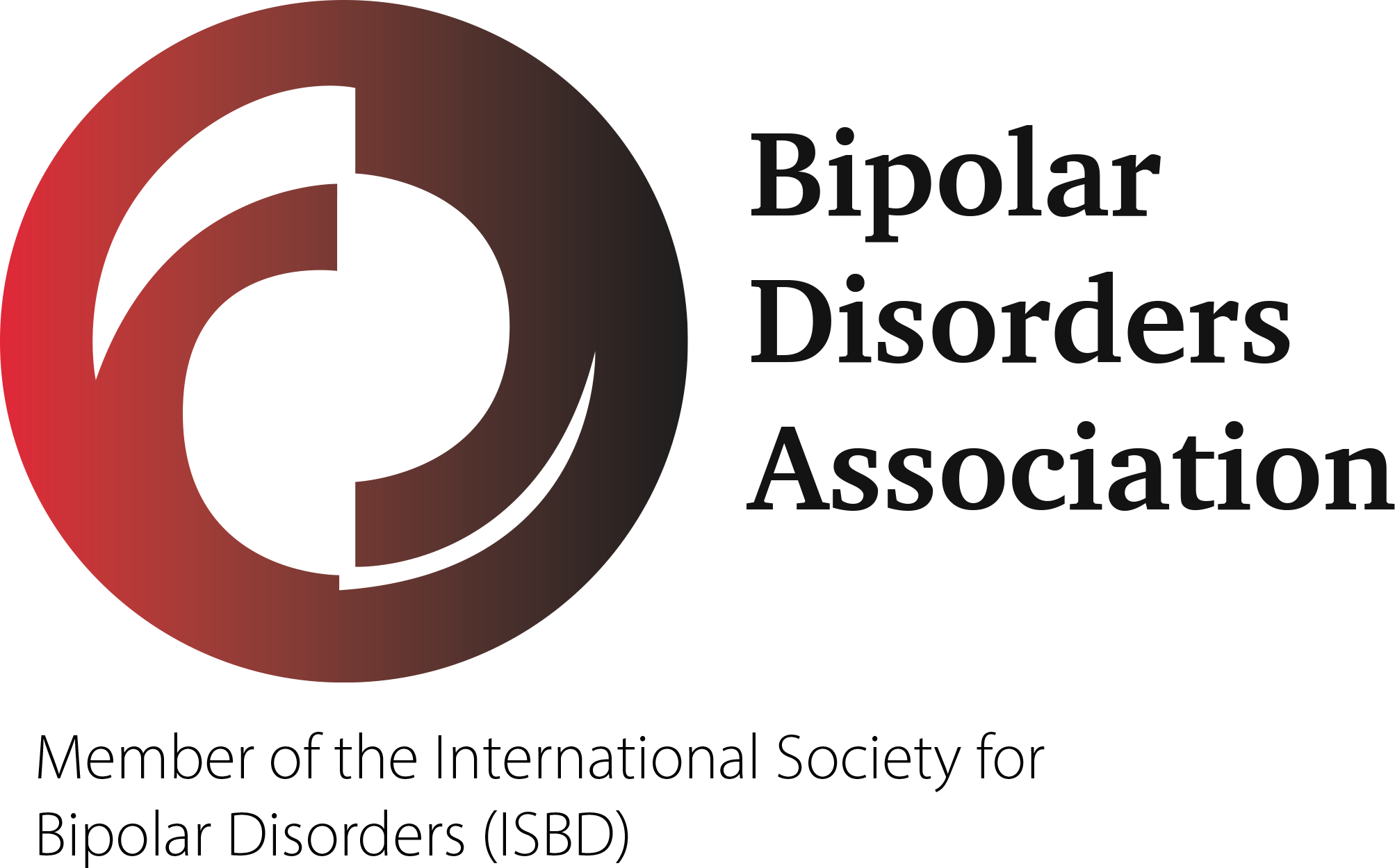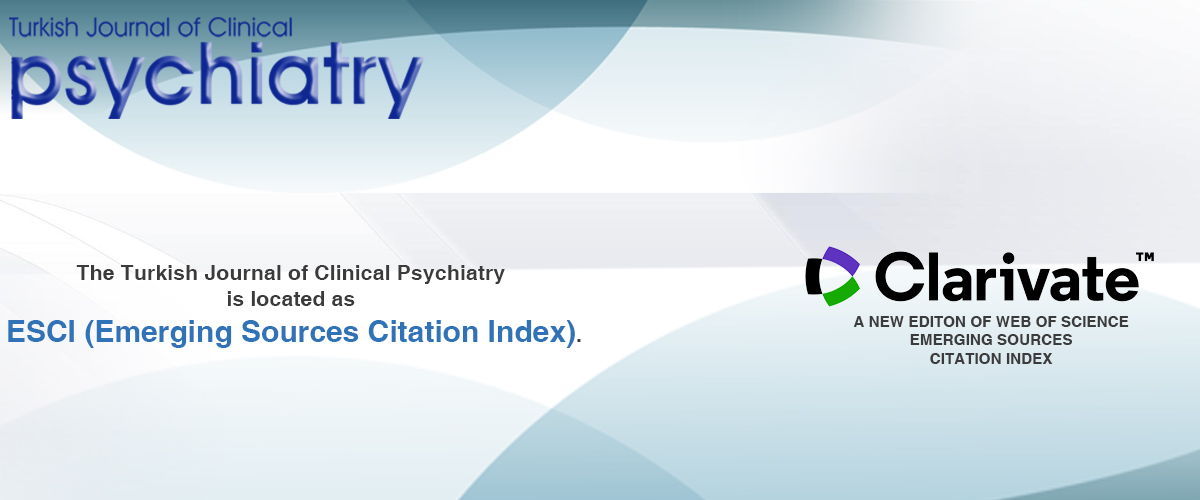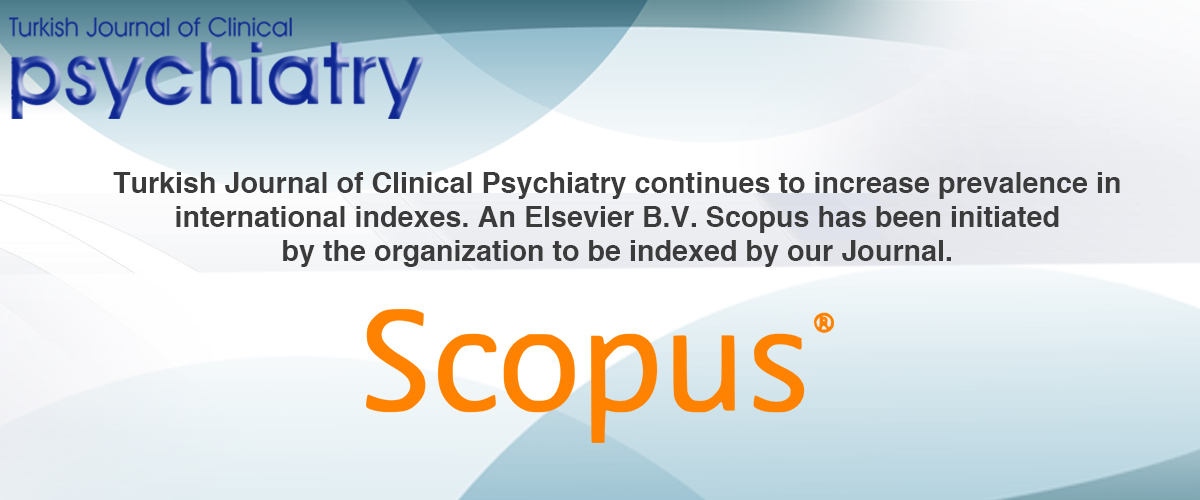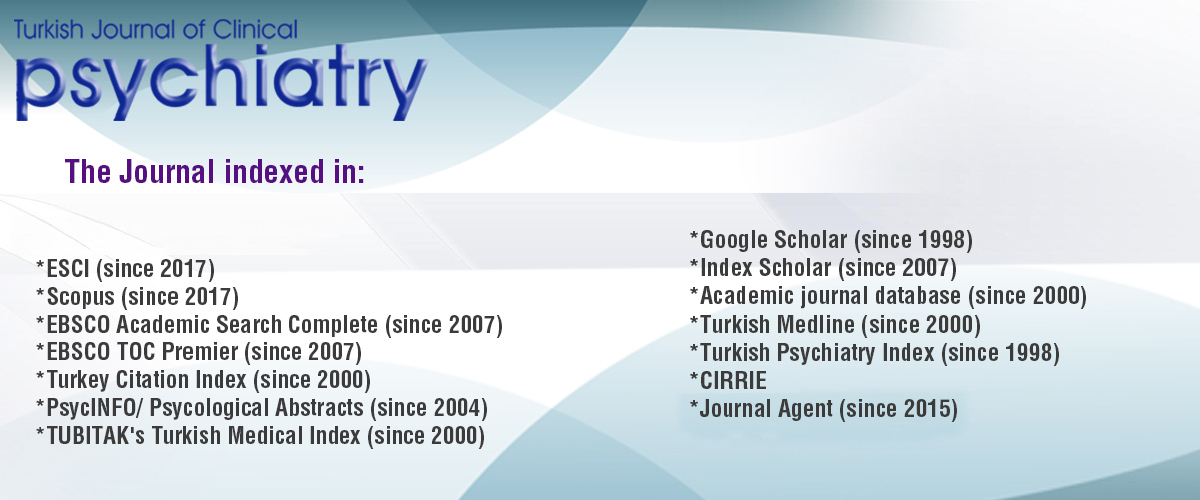





Information for Authors
Turkish Journal of Clinical Psychiatry is an open access, peer-reviewed scientific journal published quarterly in March, June, September, and December, with four volumes per year. Turkish Journal of Clinical Psychiatry has been published since 1998.
Turkish Journal of Clinical Psychiatry includes research, review, brief reports, case reports and letters to the editor in the fields of psychiatry, clinical psychology, psychopharmacology and neurology. The journal accepts articles in English and Turkish.
*Turkish Journal of Clinical Psychiatry accepts articles in English and Turkish. The language of Turkish Journal of Clinical Psychiatry is English. Articles submitted in Turkish and accepted after peer review will be translated into English by the authors. Articles submitted in English and accepted after peer review will not go through the translation process (from English to Turkish). All articles will be published after being reviewed by the editorial board for English grammar.
For submitted articles; submission, evaluation, publication at any stage of the fee is not requested.
Accepted articles are given DOI numbers starting from 2016. Digital Object Identifier (DOI) System is a unique alphanumeric string assignment system that provides permanent and easy access to content in the digital environment. Articles with DOI names and included in the system acquire rapid global accessibility and the authors gain a publication advantage. This gives academicians an advantage over time. The DOI System is an ISO international standard and is managed by the International DOI Foundation. Those authors whose articles have been published in our journals registered with the DOI System are actually enabling rapid access to their articles by the national and international scientific public and as such also increasing the citation potential of their articles.
Our journal is sending and tracking articles through the Journal Agent system. It is evaluated quickly by the article tracking system which allows users to use easily and fastly.
The journal is committed to upholding the highest standards of publication ethics and the editorial and publication processes are in line with the guidelines of the Committee on Publication Ethics (COPE), World Association of Medical Editors (WAME), the International Committee of Medical Journal Editors (ICMJE) and Council of Science Editors (CSE).
The opinions expressed in the articles published in the journal belong to the author(s) and the editors, editorial board and/or publisher are not responsible.
OPEN ACCESS POLICY
Turkish Journal of Clinical Psychiatry is an open access journal on the grounds that making content freely available to the public supports a greater global exchange of knowledge. All content of Turkish Journal of Clinical Psychiatry is freely available without charge to the user or his/her institution.
Content of Turkish Journal of Clinical Psychiatry are licensed under Creative Commons.
The Journal’s archive policy requires the usage of publisher’s pdf version. Author cannot archive pre-refereeing and draft post-refereeing version. The policy can be viewed on http://www.sherpa.ac.uk/romeo/search.php?issn=13095749&type=issn&la=en&fIDnum=|&mode=simple
REVIEW OF ARTICLES AND ETHICAL ISSUES
Turkish Journal of Clinical Psychiatry is based on independent, unbiased, double-blinded peer-review reports in the evaluation of the articles. The submitted articles, their originality, methodologies, and the importance of the topic discussed are evaluated by members of the Editorial Board. This is followed by an unbiased double-blind peer-review by two or more independent experts in the field. For all submissions, the Editorial Board is the final authority in the decision-making process.
The referees are unaware of the identity of the authors and the authors are unaware of the referee's identity.
Turkish Journal of Clinical Psychiatry complies with the editorial and publication guidelines of European Association of Science Editors (EASE). Before submission, authors are recommended to follow the EASE Guidelines for Authors and Translators, freely available in many languages. https://ease.org.uk/publications/author-guidelines-authors-and-translators/. These guidelines provide simple, concise and clear advice aimed at making international scientific communication more efficient. They also draw attention to ethical issues such as authorship criteria, plagiarism, conflict of interests and more. Adherence to the guidelines is one of the editorial priorities for submitted papers to the journal.
Submitted articles are assessed by at least two advisory boards, whose names are kept confidential. Reviews of the completed essays in the advisory board are discussed in the editorial board. The editorial and publication processes of our journal have been formatted according to the guidelines of organizations International Committee of Medical Journal Editors (ICMJE), World Association of Medical Editors (WAME), Council of Science Editors (CSE), Committee on Publication Ethics (COPE), European Association of Science Editors (EASE) and National Information Standards Organization (NISO) The editorial and publication processes of the journal are conducted in accordance with the Principles of Transparency and Best Practice in Scholarly Publishing (doaj.org/bestpractice)
The Editorial Board of the journal handles all appeal and complaint cases within the scope of COPE quidelines. All submissions are screened by a similarity detection software iThenticate.
If there is an citation from the previously published articles, the author of the article must have the right to publish the article and have written consent from the authors and state it in the article. The consent document must be sent to the editorial board along with the article. Reviewers are expected to comment on potential research or publication misconduct such as unethical research design, duplication, plagiarism, etc.
The journal follows the COPE Ethics Flowcharts for dealing with cases of possible scientific misconduct and breach of publication ethics
Turkish Journal of Clinical Psychiatry encourages authors to follow Sex and Gender Equity in Research – SAGER – guidelines developed by the EASE when drafting their manuscripts. These guidelines aims to promote the diversity and inclusion of sex and gender considerations in research. Both English and Turkish versions of SAGER guidelines are available.
Conflict of Interest
Turkish Journal of Clinical Psychiatry requires authors and individuals taking part in evaluation process of a manuscript to disclose any existing or potential conflict of interest that could unduly influence (or be reasonably seen to do so) one’s responsibilities in the process. The types of competing interests that should be declared include financial ties, academic commitments, personal relationships, institutional affiliations. To disclose potential conflicts of interest, the ICMJE Potential Conflict of Interest Disclosure Form should be filled in and submitted by all contributing authors. Cases of a potential conflict of interest of the editors, authors, or reviewers are resolved by the journal’s Editorial Board within the scope of COPE Conflict of Interest Flowcharts and ICMJE Conflict of Interest guidelines.
Besides conflict of interest, all financial support received to carry out research must be declared while submitting the paper. The role of the funder in the research must also be declared.
Human and Animal Rights
Turkish Journal of Clinical Psychiatry takes as principle to comply with the ethical standards of World Medical Association (WMA) Declaration of Helsinki – Ethical Principles For Medical Research Involving Human Subjects revised in 2003 and WMA Statement on Animal Use in Biomedical Research revised in 2016.
Approval of research protocols by the ethics committee in accordance with WMA Declaration of Helsinki mentioned above is required for experimental, clinical, and drug studies and for some case reports. If required, ethics committee reports or an equivalent official document must be provided by the authors.
For animal studies, it should be ensured that the welfare of animals used for research is respected and the measures taken to prevent pain and suffering of the animals is stated clearly.
Ethics Committee Approval and Informed Consent
The original ethics committee documents of all research articles must be uploaded to the system. Approvals of research protocols from national or local ethics committees must be submitted with the manuscripts. Articles reporting the results of experimental research with human subjects should include a statement that informed consent has been obtained after the procedure(s) have been fully explained. In the case of children and those under guardianship or certified insane, authors are asked to include information on whether the consent of the legal guardian has been obtained.
Each individual listed as an author should fulfill the authorship criteria recommended by the International Committee of Medical Journal Editors (ICMJE). The ICMJE recommends that authorship be based on the following 4 criteria:
- Substantial contributions to the conception or design of the work; or the acquisition, analysis, or interpretation of data for the work;
- Drafting the work or revising it critically for important intellectual content;
- Final approval of the version to be published;
- Agreement to be accountable for all aspects of the work in ensuring that questions related to the accuracy or integrity of any part of the work are appropriately investigated and resolved.
The authors must notify the written approval of these four rules in the Copyright Transfer Form. Those who do not meet all four criteria should be acknowledged in the title page of the manuscript. If the editorial board suspects a case of “gift authorship,” the submission will be rejected without further review.
Authors should be fully open in matters such as direct or commercial links, financial support in their work. If authors have this sort of relationship, they have to tell it how it is related, or else they have to declare that they have no relation. Our journal adopts WAME's definition of conflict of interest.
COPYRIGHT NOTICE
ANP Publishing is the owner and copyright holder of Turkish Journal of Clinical Psychiatry. Authors are required to fill and submit the copyright transfer form. The content can be used as a reference in scientific publications and presentations. If the use of articles in a way which is not permitted by the above license is required, one must contact either the copyright holder or the publisher ANP Publishing.
The publishing rights of the articles published in our journal belong to ANP Private Health Services. Authors are not paid royalties.
Authors should transfer the copyright of the publication to Turkish Journal of Clinical Psychiatry. According to the Copyright Act, the right of publishing accepted to be published belongs to the publisher institution. This period becomes binding with the acceptance of the manuscript. Turkish Journal of Clinical Psychiatry uses Creative Commons licensing terms.
Creative Commons CC BY-NC-ND License
The scientific and legal responsibility of the published articles belongs to their authors. Any opinions and views expressed in the articles published by the journal are the views and opinions of the author(s), and not views of or endorsed by the Turkish Journal of Clinical Psychiatry , editors and editorial board. The editors, editorial board, and publisher disclaim any responsibility or liability for such materials.
In order for the submitted articles to be processed immediately, they must comply fully with the written rules.
The arrival dates and acceptance dates of the manuscripts are specified in the number of manuscripts published. On the web page of the journal, all the articles are in full text versions on the front sent in Turkish and English summary versions. The content is made available for free access on the internet page of the journal following the completion of the broadcast period. The authors are not subscribed to the journal, but the journal published by them is not sent to them.
PREPARATION OF THE MANUSCRIPT
Manuscripts must be prepared in line with ICJME Recommendations for the Conduct, Reporting, Editing, and Publication of Scholarly work in Medical Journals
In order for the articles sent for publication to be published to be subject to impartial evaluation by experts, information about the identities of the authors must be found on a separate page at the beginning of the article.
Manuscripts must be sent in a signed authorship that states that the manuscript has not been published in a journal or sent for publication and that all publishing rights have been transferred to ANP Private Health Services LTD.
You can send your articles by clicking the "online submission" button at our web site. For any problem you can contact us at [email protected] .
On the first page, the name, surname, title, work addresses and e-mail addresses of the authors should be listed below the title of the article. In the end, the address, telephone and e-mail address of the responsible author should be included
Authors are required to submit the following together with their manuscripts:
• Copyright Agreement Form
• Author Contribution Form
• ICMJE Conflict of Interest Form (Conflict of Interest statements should be provided in the relevant text box during online submission. Additionally, all contributing authors are required to complete the ICMJE Potential Conflict of Interest Disclosure Form.The corresponding author must acquire all of the authors’ completed Conflict of Interest forms and e-mail them to [email protected] )
The limitations for each article type are shown in Table 1. Key words should be at least 3 and no more than 6 words, depending on Index Medicus. The research articles and brief reports should consist of headings in Turkish and English abstracts, Objectives, Method, Results, Conclusion.
Table 1. Limitations for each manuscript type
Type of manuscript |
Word |
Abstract |
Reference |
Table |
Figure |
Research Article |
3500 |
250 (Structured) |
- |
6 |
6 |
Review Article |
5000 |
350 |
50 |
6 |
10 |
Case report |
1500 |
150 (Structured) |
20 |
1 |
3 |
Brief report |
1500 |
150 |
20 |
1 |
3 |
Letter to the Editor |
500 |
No abstract |
20 |
No tables |
No figures |
Editorial |
1200 |
No abstract |
20 |
No tables |
No figures |
Guest Editorial |
1200 |
No abstract |
20 |
No tables |
No figures |
The abbreviations should be internationally accepted, clearly marked in the place where they are first used, and displayed in abbreviated form in parentheses. Abbreviations should not be included in the summary. Footnotes should not be used in manuscripts, descriptions should be given in writing.
The articles can only be submitted via the online article uploading and evaluation system of the journal at www.klinikpsikiyatri.org. Articles sent from other circles will not be evaluated.
AI-based softwares and programs, a product of rapidly advancing technology in recent years, has begun to be used in many area including scientific article writing. These softwares and programs offer various oppotunities to researchers, from literature reviewing to research conceptualization, from recommendations for analysis to translation. As the Turkish Journal of Clinical Psychiatry, it is expected you to adhere to certain rules in this regard. AI-based softwares or programs cannot be an author of an article. It is expected you to declare at which stage did you use these softwares or programs on our online submission system and each stage you declare will be indicated at the end of your article. The Editorial Board will keep the right to reject your manuscript before sending reviewers according to your AI-based software or program usage statement.
TYPES OF ARTICLES RESEARCH
The research articles should consist of the following subheadings: Introduction, Methods, Results, Discussion and Conclusion. The research articles should consist of headings in Turkish and English abstracts, Objectives, Method, Results, Conclusion.
The articles should be prepared in accordance with ICMJE-Recommendations for the Conduct, Reporting, Editing and Publication of Scholarly Work in Medical Journals. Ethical principles should be observed in research. Ethics committee decisions and case approval forms should be attached to the article and should be indicated in a sentence that the ethical principles are followed.
The limitations, barriers and inadequacies of original research should be mentioned in the "Discussion" section before the conclusion section.
Review and Case Report
In the case of review and case report types, the main writing scheme above should be followed. After the summary page, it should be taken in accordance with the type of the article, and the number of references in the collections should not exceed 50. In reviews, one of the writers must have published three or more original researches on the subject. Review authors should have accumulated expertise on the topic, as international literary publications and citations. Authors who meet these criteria can be invited by the Editorial Board to write review articles.
The introduction and discussion parts of the case reports presentations should be concise and the number of references should be limited. These articles should include the subheadings "Introduction", "Case Report" and "Discussion".
Brief Report
Brief reports should contain abstracts, be short-core, and have limited references. Brief report (except title page, resources, table / figure / picture) must not exceed 1500 words.
Letter to editor
Letter to editor section should be short-concise, non-abstract, and limited in references, in order to bring criticism, contribution or information that was not prepared or prepared as an original work in the journal.
Tables, Figures and Pictures
Tables, Figures and Pictures should be numbered and indicated in the order of transitions in the text. The title or subheadings should be added to the article, each page being prepared on a separate page. Fİgures should be sent in quality to which photographic film can be taken. The charecters, numbers or symbols in the figure should be clear and legible.
Tables should be added to the main file, presented after the reference list, numbered according to the transition order in the main text. Descriptive headings should be placed on the tables and the expansions of the abbreviations in the table should be defined under the table. Tables should be prepared in a Microsoft Office Word file using the "Insert Table" command and should be easily readable. The data presented in the tables should not be a repeat of the data presented in the main text; they must be of a supporting nature in the main text.
Pictures, graphics and photographs (in TIFF or JPEG format) must be uploaded to the system as separate files.
References
When cited, the latest and most recent publications should be preferred. DOI numbers of earlier cited online articles must be provided. The authors are responsible for the correctness of the references. Journal titles should be abbreviated in accordance with journal abbreviations in Index Medicus / Medline / PubMed. All author names should be listed in the references. Arabic numbers should be used in parantheses when referring to references in the main text.
An example of the notation in the text: Many studies emphasize the importance of the couple's unconscious identification process as a principal mediator of couple's marital satisfaction and even argue that the activation of projective identification process is one of the underlying sources of conflicts that distress couples (1,2,3,4,5,6). References an example of the notation:
- Abedi MR, Bahrami F, Etemadi O, Fatehizadeh M, Ghasemi V. Personality types and marital satisfaction. Interdiscip J Contemp Res in Bus 2012; 4:372-383.
- Blum JS, Mehrabian A. Personality and temperament correlates of marital satisfaction. J Pers 1999; 67:93-125.
Vancouver style resource presentation should be done. Abbreviations for journal titles should be in the style used in "NLM Catalog: Journals cited in NCBI Databases"(http://www.ncbi.nlm.nih.gov/nlmcatalog/journals). Journals that have not been added to the index should be abbreviated. Reference styles for different types of publications are shown in the following examples:
If the reference is an article, Boyce P, Parker G, Barnett B, Cooney M, Smith F. Personality as a vulnerability factor to depression. Br J Psychiatry 1991; 159:106-114.
Zinbarg RE, Barlow DH, Liebowitz M, Street L, Broadhead E, Katon W, Roy-Byrne P, Lepine J-P, Teherani M, Richards J, Brantley PJ, Kraemer H. The DSM-IV field trial for mixed anxiety-depression. Am J Psychiatry 1994; 151:1153-1162
An additional number of journal, Beskow J. Depression and suicide. Pharmaco-psychiatry 1990; 23 (Suppl 1): 3. Burrows GD, Norman TR, Judd FK, Marriott PF. Short-acting versus long-acting benzodiazepines: discontinuation effects in panic disorders. J Psychiatr Res 1990; 24 (suppl 2): 65-72.
If the reference is a book, Beahrs JO. The Cultural Impact of Psychiatry: The Question of Regressive Effects, in American Psychiatry After World War II: 1944-1994. Edited by Menninger RW, Nemiah JC. Washington, DC, American Psychiatric Press, 2000, pp. 321-342.
If the reference is the translation book, Saddock BJ, Saddock VA. Klinik Psikiyatri. Aydın H, Bozkurt A (Çeviri Ed.) 2. Baskı, Ankara: Güneş Kitabevi Ltd. Şti., 2005, 155-157.
If the reference is thesis, Yılmaz B. Ankara Üniversitesindeki Öğrencilerin Beslenme Durumları, Fiziksel Aktiviteleri ve Beden Kitle İndeksleri Kan Lipidleri Arasındaki İlişkiler. H.Ü. Sağlık Bilimleri Enstitüsü, Doktora Tezi. 2007.
For the articles in the press, Cai L, Yeh BM, Westphalen AC, Roberts JP, Wang ZJ. Adult living donor liver imaging. Diagn Interv Radiol 2016; 24. doi: 10.5152/dir.2016.15323. [In press].
For congress notification, Yumru M, Savas HA, Kalenderoglu A, Bulut M, Erel O, Celik H. İkiuçlu bozukluk alt tiplerinde oksidatif dengesizlik. 44. Ulusal Psikiyatri Kongresi Bildiri Kitabı 2008; 105.
For references from the internet, World Health Organization. Depression. http://www.who.int/mediacentre/ factsheets/fs369/en/. Erişim tarihi: Ağustos 22, 2016.
The authors are responsible for the correctness of the references. References that are not directly utilized or transferred from other references should not be specified. Unpublished works or personal correspondence should not be cited.

